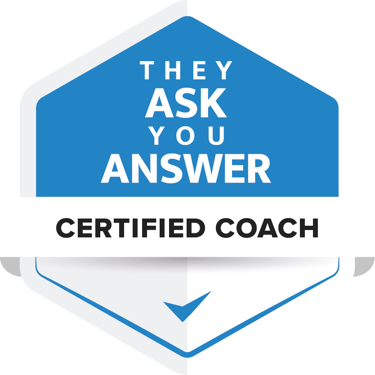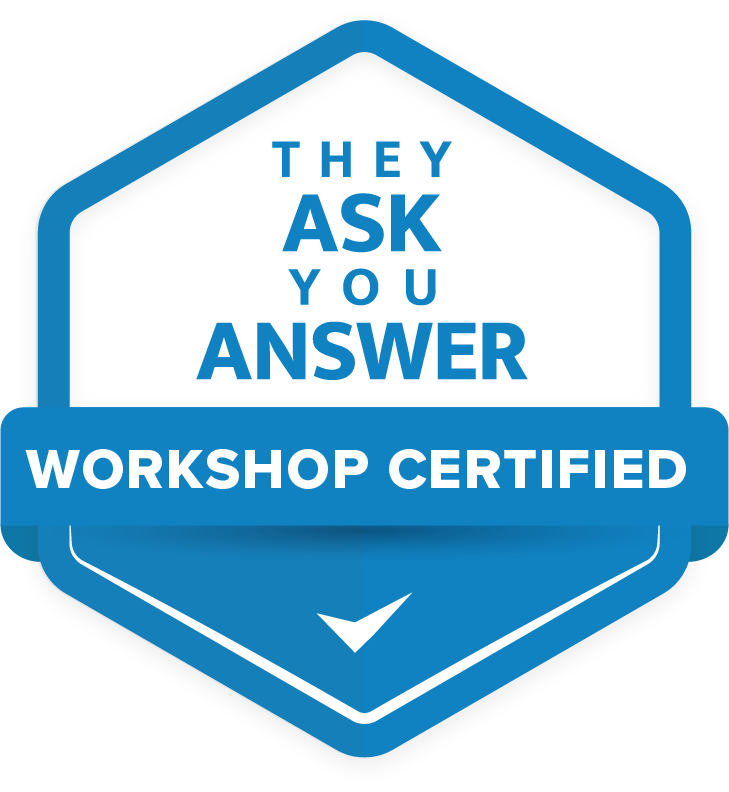How do I know if I am ready for They Ask, You Answer?

Whether you recently learned more about They Ask, You Answer, or are ready to start your They Ask, You Answer journey, you may be wondering where best to start.
And if that's where you are now, you're already asking the right questions.
They Ask, You Answer is more than a content strategy; it is a business philosophy that requires you to embrace some fundamental beliefs.
It argues that success in any business is based on trust. And to gain that trust, companies must be obsessed with their buyers' questions, concerns and problems.
They need to answer these questions as honestly and thoroughly as possible - online and offline.
But it doesn't stop there.
In this article, we outline six fundamental beliefs that are typical of a true 'They Ask, You Answer' company and pave the way to successfully implementing this business philosophy.
By the end of this article, you'll know if you're ready to embark on your They Ask, You Answer journey. Let's go!
1. You understand that buyers have fundamentally changed
Take a moment to consider how you store today, compared to 10 or 15 years ago.
Would you say you are less patient? More critical? Less trusting of salespeople?
Along the same lines, how much do you want to know about what you want or need before you even consider talking to a salesperson?
If you are like most buyers, you do a lot more research online before you buy anything, are wary of making mistakes and want to have a very good idea of what is a good fit for you.
This is what happens before what is called the "zero moment of truth" (ZMOT). That's the moment when you pick up the phone, fill out that form, send that email or otherwise contact them to begin your buying process.
The actions you took before that to find a solution or supplier are called "zero moment of truth activities."
But why is this important and what does it tell us about our buyers?
According to renowned U.S. research and consulting firm Forrester Research, more than 70% of the purchase decision is made before the ZMOT.
If you were to estimate what percentage of that decision was made 10 years ago for the ZMOT, it would probably be significantly lower.
Probably somewhere around 40%.
We did not have access to all the information we needed because it did not exist or the search engines were not developed enough to find it.
Buyers now have easy access to this information 24 hours a day - and they demand it.
This is essential to understand before you get started They Ask, You Answer. Indeed, it is the basis for why WE too, as a business, must change and why the way we communicate must change.
If you do not agree with this or do not understand how today's buyer has changed, you will not be sufficiently motivated to embrace a new way of communicating or do what it takes to be successful They Ask, You Answer.
2. You accept that you are not the best solution for everyone
In addition to understanding how your buyers' behavior has changed, you also need to understand that their expectations have changed.
Gone are the days when a seller had the upper hand. And as buyers, we know that.
Because we buyers are in control, we expect the most honest, complete and unbiased information when making purchases.
In other words, we want to be in control of making the best decision ourselves; we don't want to be "foisted" on something.
But most companies do not have the confidence that buyers will still choose them if they have all the information. This may also be due to insufficient confidence in their own product or company. This is a holdover from the days when we were expected to do everything for sales.
Today, most of us will agree that we want our buyers to make the best decision based on all available information and in complete confidence; we want them to fit in with us and be happy with their purchase.
We just haven't gotten into the habit of providing all that information, and especially not the information that could reveal drawbacks to our own product or service and possibly mean missing out on a deal.
You know you're ready for They Ask, You Answer if you're willing to trust that buyers will always make the decision that's best for them and if you want to help them avoid a bad buying decision.
Unfortunately, companies that do not trust their buyers inadvertently send them elsewhere where the buyers do find the information they are looking for. Often those will be competitors.
3. You are willing to deal with 'difficult' topics and also talk about your competitors
In our experience, companies almost always initially respond positively to the idea behind They Ask, You Answer.
But what not all companies realize is that They Ask, You Answer means answering all of their customers' questions - including those they would rather ignore or not answer on their Web site.
Getting started They Ask, You Answer also means:
That's They Ask, You Answer: being honest, transparent and complete in your content and trusting that the prospect himself is capable of making the right decision.
4. You are willing to invest in internal content production
Although this item ranks fourth on our list, it is probably in the top two "non-negotiables" when it comes to starting They Ask, You Answer.
They Ask, You Answer is a content strategy with one important crux: it only works if you and your team implement it yourself.
That means you can't outsource content creation to a team of freelance writers.
That just doesn't work.
Who knows your buyer better than you? Who knows your audience's fears, worries and concerns better?
Who has more passion for your product or service and understands the "soul" of the organization better than you and your team?
These are things that no freelance writer will ever be able to fully understand.
This is actually great news because it means you can take back control of your digital sales and marketing.
Your investment involves putting the right people in the right places and making your team available to help the content creators with the content.
Find a content manager or content writer who can interview your content experts, maintain a content calendar and take this marketing initiative into their own hands, and you've made the first crucial investment They Ask, You Answer.
If you are serious about targeting today's digital buyer and their preference for video and visual content, you should also consider hiring an in-house videographer and getting your staff in front of the camera. This is an important part of your 'They Ask, You Answer' journey. We call this "The Visual Sale.
5. You understand that long-term commitment is needed
There are many sales, marketing and communication strategies that can be beneficial in the short term and provide a quick ROI.
The problem is that things based on quick short-term actions tend to produce short-term results.
For example, a powerful ad campaign on social media is a great way to generate conversions quickly, but if you set up a campaign and take your hands off the wheel (set and forget), the results will gradually dwindle to zero.
On the other hand, there are many strategies that, if seen as a long-term investment involving continuous effort, will only continue to grow in effectiveness and profitability.
They Ask, You Answer is one such strategy.
It requires long-term commitment, a cultural shift, and you have to stay the course to reap the enormous benefits.
This commitment is indefinite, but produces longer-term results. That is, you benefit year after year from the work you put into producing They Ask, You Answer content.
At the time when many companies begin their They Ask, You Answer journey, their Web sites have little authority. Most of their web pages, no matter how beautiful, are rarely found in search engines.
So these companies put some time into creating the right content, and when search engines start to notice it, the companies start to see growth. Maybe that growth is small at first, but over the course of a year they have tripled or even quadrupled the traffic to their website.
Some companies see that, think they are there, and slowly give it less of a priority. Other companies go a step further, stand firm and continue to apply the 'They Ask, You Answer' model throughout the company.
Can you guess which companies are getting the most return on their efforts? And can you guess which companies are seeing their results gradually diminish?
That's the nature of They Ask, You Answer. You know you are ready to start when you are willing to trust the process and embrace it as a long-term shift in your culture and mindset, not just a temporary tactic.
6. Know that you are no different
It is interesting to think about how we view our companies within a global marketplace. In general, we value our "uniqueness" relative to our competitors, other companies or other industries.
We consider ourselves "special" or "different."
And yes, we all have different products, services and solutions that solve a variety of needs and problems for our customers.
But there is one thing that binds us all, whether we sell products or services, focus on B2B or B2C, operate locally or internationally, are large or small: we are all about trust.
This is a fundamental emotion that our buyer must feel in order to want to engage with us.
If they don't trust us, we can assume they will be more reserved, uncertain and skeptical. These are not emotions that drive buyers to action, and they are certainly not a basis for building a good relationship.
So in the end, you cannot say you are "different" and at the same time be convinced that you are in the same "battle of trust" as all of us.
A company that is truly ready for They Ask, You Answer can say this:
"We are no different. We are engaged in a "battle of trust," just like everyone else. But if we want to become the most trusted voice in our industry, we have to be willing to talk about things no one wants to talk about. We must empower our employees to help us educate our buyers in the way they want to learn. And we accept that They Ask, You Answer journey never ends. We know the things we do won't always work right away, but we are patient and not afraid to fail."
Confidence in the process
This obsession with trust not only means taking steps to earn your buyer's trust, but also that you must trust your buyer.
This means you want him to make the best, most informed buying decision, with complete and accurate information, and you are willing to give him that information, even at the risk of him not buying from you.
In addition, you have to trust the process and really work at it. You have to trust your employees and give them a degree of control over how they communicate with your buyers. It cannot be said often enough how important trust is to your business and your buyer.
Furthermore, it is important to note that They Ask, You Answer is a model, not a formula. A formula says, "Do these six things and you will be successful." A model is something you grow into and shape to fit your needs. It helps you avoid getting off track on your journey.
It's a big job to get all the noses in your company to move in the same direction where They Ask, You Answer is concerned.
That's because, unlike strategies in the past, They Ask, You Answer must be embraced by all teams - leadership, sales, marketing, service, and so on. It is not the domain of one team or one individual. It is a cultural shift within your company, and that takes time.
Related articles
December 24, 2024
-
Reading time: +/- 9 min
April 25, 2024
-
Reading time: +/- 10 min
Aug. 20, 2024
-
Reading time: +/- 7 min
August 8, 2024
-
Reading time: +/- 8 min








